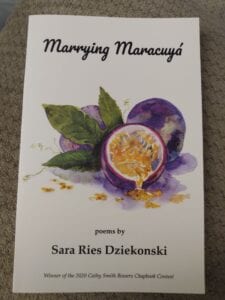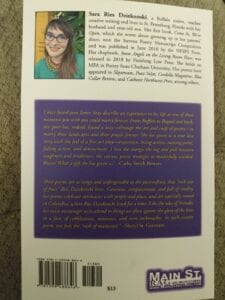Marrying Maracuyá
By: Sara Ries Dziekonski
4/23/21
Blog #21
Hello Wonderful People! Here’s some exciting news: my latest collection of poems, Marrying Maracuyá, is fresh off the press from Main Street Rag! Two boxes of books arrived at my doorstep over the weekend and I sliced the tape, pulled open the cardboard flaps, and held my book in my hands for the first time. In celebration of my new chapbook being born into the world, I thought I’d share a couple poems from this new collection, which features poems that take place in beautiful Colombia. In 2014, my adventure partner Tad and I had the great privilege of backpacking around Colombia for a few months. We fell in love with the landscapes and the people’s warmth and generous spirit and wanted to stay past the date on our return ticket, so we found volunteer positions teaching EFL for SENA, Colombia’s public university. We ended up teaching in four different cities over the course of the next four years.


The first poem in the collection, “Before We Leave the Deep Freeze of Buffalo,” is the story of me telling a customer that I am going to Colombia and his response: “Why would you want to go there? Cocaine, cartels, kidnappings…”. I got that reaction a lot, and it seemed that people knew little of Colombia other than what they’d seen on the news and in movies. In this book, I attempt to bring the readers a fuller picture of Colombia, one with generous amounts of café lattes with foam hearts, gorgeous mountains, scarlet macaws, sweat-dripping dancing, and bursts of the fruit I love so much, maracuyá.
Before We Leave the Deep Freeze of Buffalo
Bob’s shooting darts,
his usual cup of ice
in a pitcher of Blue
to keep it strong and cold.
It’s the coldest winter
we can remember.
Big Mike, the resident debater, agrees.
Joe enters, says, stomping
his boots back to brown,
Why do we live here?
It’s my last Monday shift
and slow, again,
before Tall One and I pack up
the apartment’s guts,
shove them into storage
to roam around Colombia,
not knowing what the hell we’ll do
once three months are up.
Our guidebook says: Colombia,
the only risk is wanting to stay.
Bob studies the dart tip,
seeds of dreams crushed
between forehead scrunches.
Why would you want to go there?
Cocaine. Cartels. Kidnappings…
But Bob never danced in a sweaty spiral
to Musica Folklorica from the Andes,
never scaled a mountain just to touch
the stone Jesus I’d say goodnight to,
prayerless from a bedroom window,
was never handed a latte topped with a foam heart
in a courtyard of begonias in February,
and told Buen provecho, voice
an ancient love song.
And here’s a poem from the chapbook that was published in Slipstream Magazine called “The Gringa Swims in Cali.” It’s an embarrassing story of how a little Spanish error can change the meaning completely, and really about my experience being an awkward gringa while living in a country that is not my own.
The Gringa Swims in Cali
My people from Buffalo would laugh
at Colombians wearing winter jackets
in seventy-degree weather or at students
who type excuses that read
I couldn’t come to class because it rained.
Only gringos would brave
the post-rain humid-crisp air and swim,
I think, as I slide into the empty pool
in this salsa music-blasting, sweat-dripping land
where sometimes people greet:
Hola mi pez, or Hi my fish.
That tall man in another lane must be Tad,
said he’d meet me after the sauna so I front crawl over,
dive beneath him and wiggle like a fish
so he’ll see his girlfriend in her hot pink swim bottoms.
But when I dart up for air, I’m facing
a confused, laughing stranger, so I try to explain
with my bright blue goggles
in the land of thong swimsuits:
Creo que eres mi novio
or
I think you’re my boyfriend!
Oops.
Should have studied the past tense for “think.”
As I chop-stroke back to my lane muy rapido
I realize—it doesn’t matter what I do.
I could run naked down the streets shouting
I’m a gringa, gringaaaaaa!
This is what free feels like.
Screw constantly checking myself,
caring what others think.
Today I was a tropical fish who swam with another fish.
Once I dreamed the streets were rivers
so people had to swim everywhere,
to schools and banks, bars and churches
and the people flowed with time
against any measures.
Thank you for reading, and I hope you enjoyed the poems!
~Sara


